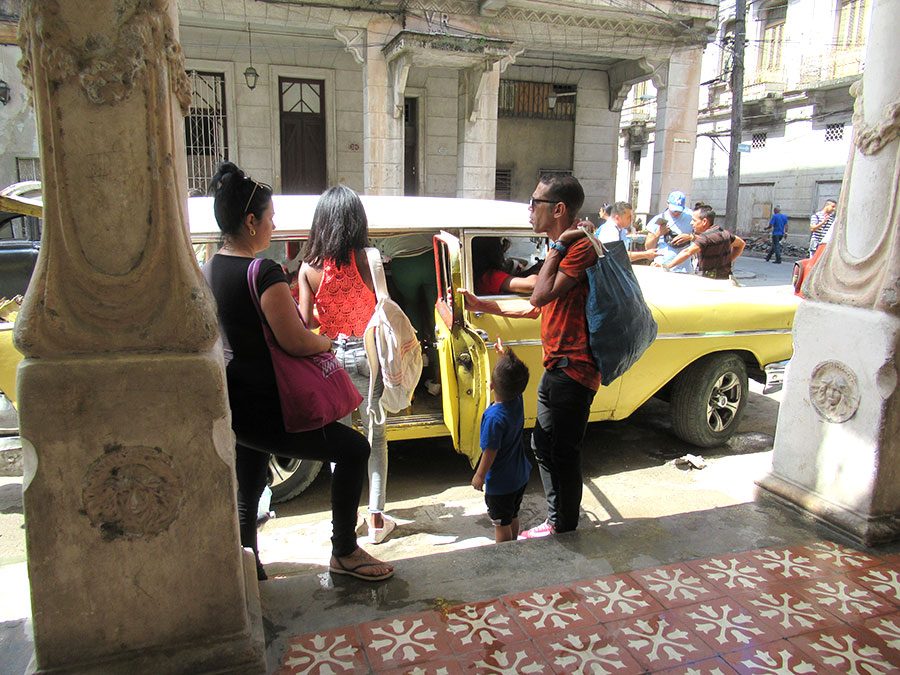Cuba trip set for February break
Catching a cab in Havana
Over the February break, 16 students from both Northern Vermont University Johnson and Lyndon will head to Havana, Cuba, as part of the travel immersion course The Art and Culture of Cuba, which will provide students with an extraordinary opportunity to visit a country in deep transition as Cuba moves beyond the Castro era.
Taught by Professor of Writing and Literature Tyrone Shaw and Professor of Fine Arts Ken students will spend much of the week exploring Cuba’s capital in a way no standard off-the-shelf educational trip can offer.
Shaw has been traveling to Cuba since 1991, and that first glimpse was the beginning an ongoing fascination.
“Over the course of years of visiting Cuba, Nancy (Shaw’s wife and one of four trip leaders) and I have developed some very deep friendships there,” Shaw said. “These people are family to us now. We have the privilege to have shared the fitful transformation of Cuba since 1991. We have followed these people through transitions from the worst economic period since the revolution when the Soviet Union crashed and Cuba was all of a sudden on its own,” Shaw said.
Having been introduced to the city in 1991 on assignment for a magazine, Shaw is nearing in on three decades since the first encounter and has seen the country change drastically.
“When I first went there, there were no tourists in Havana. Now you can’t avoid them,” he said. “Of course, Fidel Castro is gone now, and so is Raul Castro, so the transformation to us is perhaps incomprehensibly slow, but Cuba is moving. Part of what is so fascinating for students now is the uncertainty of a society in a kind of limbo.”
Now having done this a number of times, students will have the benefit of an imagainative and eclectic itinerary, exposing them to many aspects of Cuban life not accessible to the average tourist.
“We know how to do it, particularly my colleague Tyrone Shaw,” said Leslie.”He has been working with Cuba for decades, so the connections he has far outweigh any tour group that might want to pretend they have a great trip planned out to Cuba. It is a very special opportunity and we are really good at it, so it’s great,” Leslie said.
Taking in the experience of a diverse and unique culture is one of the key points Leslie wants his students to take away from the experience.
“I think students are always a little nervous about travel, and international travel especially. It seems that when we get into the trip, they settle in and feel very much at home. We take students to New York City every year and even that is a surprise to some students and the next thing you know, they are ready to move there. So maybe that is the biggest takeaway to just get students to become more comfortable being world citizens and realizing that they actually can take part in the larger world,” Leslie said.
One this embark, most of the students are writing and art majors, but in the past Shaw and Leslie have had students from all departments. In order to be accepted into the trip, students have to not only do some preparatory work in terms of reading and seeing films so that they are aware of what they are getting into, but they also have to, upon return, do some sort of a creative project reflecting their experiences. Typically, these projects range from videos, to musical compositions to paintings and sculpture.
As to what students think is the best thing about this trip, Leslie is hesitant to say for sure: “I don’t know. Probably the art and the music. Also the landscape and cultural opportunities that await. So you are not going to get me to say one thing that is the best part of the trip, because there are too many things. We really love giving students international experiences, and this is a very rare one for Americans because Cuba has been off limits for a really long time,” Leslie said.
With the relationship between the United States and Cuba being rocky for decades following the Cuban missile crisis, one would imagine that there would be great friction between native Cubans and American tourists. But that, according to Shaw and Leslie is far from the case.
“I think that the average Cuban really likes Americans,” Leslie said. “The longstanding problem between Cuba and America has nothing to do with individual people and you learn that immediately. There are some complications, but mostly Cubans really love Americans, are very up on America,” Leslie said.
The country just south of Florida’s native language is Spanish, which oftentimes complicates dialogue between Northern Vermont travelers and the natives. Nevertheless, travelers invariably find ways to enjoy the company of their Cuban counterparts.
“Part of the difficulty has to do with whether they speak Spanish or not, but many Cubans speak English. We have had wonderful times in rooms full of people where there isn’t a shared language and yet, we are listening to music together and eating together and that is all part of the fun. So the language barrier has never been much of a problem at all,” Leslie said.
Price of the eight-day trip is $2100, which, according to Shaw, is an incredible bargain. “Thanks to our network of friends in Havana, we can deliver an amazing experience at an amazing price,” Shaw said. “Instead of staying at hotels, for example, we stay in private houses, which are basically bed and breakfasts called casa particulars. Aside from being delightful, we all get to sample daily life as it is lived, something you will not experience in a hotel or hostel.”
The group of 20 will fly out of Montreal directly to Havana on Feb. 22, returning March 2.



